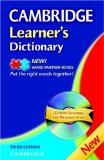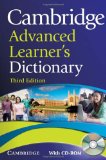Cambridge Dictionary
Review
I am quite happy to write this Cambridge Dictionary review, since Cambridge University Press has some truly wonderful dictionaries for English learners.
Click Here for Step-by-Step Rules, Stories and Exercises to Practice All English Tenses
In this article I will concentrate on two of them:
- Cambridge
Learner's Dictionary
(jump to the review)
- Cambridge
Advanced Learner's Dictionary
(jump to the review)

The definitions usually use simple words and so are easy to understand.
Here are some examples:
Abolish = to officially end something, especially a law or a system.
Electricity = a type of energy that can produce light and heat, or make machines work.
Utensil = a tool that you use for doing jobs in the house, especially cooking.
In addition to the definitions, throughout the dictionary there are examples, pictures and usage notes.
You can also get it with a CD-ROM. The CD-ROM contains everything that is in the dictionary, plus spoken pronunciation in American and British accents, synonyms and topic lists for every word in the dictionary and exam practice.
Any downsides?
Yes. It can get too simple. Meaning, not enough data to really
understand the word, or words that are omitted from the dictionary (it
only lists the most important words in English, and is not a
comprehensive guide).
Conclusions
If your level of English is very basic, then this can be a good dictionary to start with.
It has clear and accurate explanations. However, it might be too narrow
for more advanced learners.Get your own copy
Part 2:
Cambridge Advanced Learner's Dictionary

It is precise, comprehensive and friendly.
The explanations are as uncomplicated as can be, and yet it has an enormous collection of words defined.
Here are some examples:
Abolish = to end an activity or custom officially.
Electricity = a form of energy, produced in several ways, which provides power to devices that create light, heat, etc.
Utensil = a tool with a particular use, especially in a kitchen or house.
In addition to the definitions, throughout the dictionary there are many examples, maps, illustrations and photos, usage notes, learner's errors notes, thesaurus panels and a new "Let's talk" section, focusing on spoken English.
You can get it with a CD-ROM, as well.
Any downsides?
Despite being a very good and extensive dictionary it does not have all
the words in English. For the rarer words you would probably need a bigger
dictionary.
Conclusions
This dictionary is excellent
for upper-intermediate to advanced learners.Get your own copy
Get Updates, Special Offers, and English Resources
Download your FREE GIFT (the first two chapters of
English Short Stories Book and Workbook)
as soon as you join!

By submitting your email, you consent to receiving updates and newsletters from us and to the sharing of your personal data with third parties for the purposes of sending you communications. We will not spam you. You can unsubscribe at any time. For more information, please see our privacy policy.





